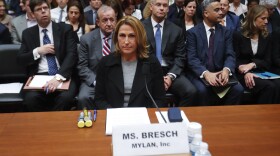-
The 2022 Missouri law prevented pharmacists from contacting patients about the efficacy of ivermectin and hydroxychloroquine — drugs promoted as COVID medications by right-wing media, despite warnings from health agencies. A judge ruled that gag order was unconstitutional.
-
Pharmacists in Kansas say pharmacy benefit managers, a group that helps determine what medications insurance covers and how much they cost, are choking them out of business.
-
Mail-order pharmacies licensed in Missouri now have to tell you when they ship your medications and let you know what to do if they’re damaged. But some want regulators to do more to protect consumers.
-
Pharmacy closures nationwide are leaving some communities at risk, including in the Kansas City area. Experts say pharmacy benefit managers are what's driving drugstores out of business.
-
Pharmacists often say their businesses can’t survive under the reimbursement rates set by pharmacy benefit managers, the middlemen. Sometimes, they pay more for drugs than they’re allowed to charge customers.
-
Kansas City pharmacists walked off the job last September to protest working conditions and brought widespread attention to the troubled retail pharmacy business. The industry is battling economic pressures, changed buying habits and labor shortages.
-
Kansas City pharmacists walked off the job last September to protest working conditions and brought widespread attention to the troubled retail pharmacy business. The industry is battling economic pressures, changed buying habits and labor shortages.
-
Pharmacy manufacturers, who are playing defense on similar bills across the country, want Missouri Gov. Mike Parson to veto the legislation because the discounted prescriptions are often sold to patients at full retail price.
-
The four pharmacy owners formed their own pharmacy benefit manager to take on the huge companies that influence how much people pay for medications.
-
Consumers and insurers charged that Mylan, Pfizer and other companies engaged in an illegal scheme to monopolize the EpiPen market by hiking the device’s price from $100 to $600.
-
Health care spending is growing a lot faster than inflation and per-capita income. But it's not because we're getting tons more care. It's because prices rise so fast.
-
One of America's richest companies will pay nearly $30 million to the state of Kansas for allegedly overcharging Medicaid for pharmaceuticals. Also, some towns in the Midwest are offering free land or $15,000 no-strings-attached checks to attract new residents.
Play Live Radio
Next Up:
0:00
0:00
Available On Air Stations











